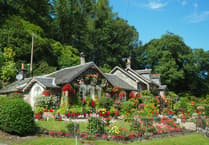A COUPLE have agreed to give £1,500 to a local environmental charity after being found to have allowed waste from their poultry farm to get into the River Wye.
The case of Ross-on-Wye couple Nigel and Sally Green appears in a newly published list of “enforcement undertakings” made to the Environment Agency (EA) in the year to the end of May, writes Gavin McEwan.
It comes amid wider concern about the health of the river, with algal blooms caused by the runoff of chemicals from poultry farming thought to have contributed to the death of salmon found south of Hereford last week (Wednesday, June 28).
The EA said that Nigel and Sally of Much Fawley poultry farm, by the river north of Ross-on-Wye, had discharged waste water from the farm without permission, “resulting [in] pollution of the river Wye” in April 2021.
The EA allows those found in breach of regulations to make voluntary offers to put right any offence and ensure it cannot happen again, as an alternative to prosecution.
In this case, the Greens undertook to stop the discharge, replace a damaged bung, undertake training and guidance and cover the EA’s costs, as well as contributing £1,500 to river conservation charity the Wye and Usk Foundation.
The Greens have also been the subject to a recent prohibition notice from Health and Safety Executive regarding their anaerobic digester on the farm, which takes in cattle slurry and chicken litter.
The Wye and Usk Foundation has also benefited from a £50,000 donation from Welsh Water, which between 2017 and 2018 was found to have made unauthorised discharges from its Eign (Hereford), Leominster and Ross-on-Wye sewage treatment works.
The water company also undertook to review procedures and carry out site improvements.
Elsewhere, river conservationists are working to find out if two salmon found dead in the Wye south of Hereford are a sign of a bigger problem in the river.
“We are trying to work out if it’s localised or more general,” Wye and Usk Foundation chief executive Simon Evans said.
“Fish in the river are being assailed by multiple pressures – high temperatures, low levels, low oxygen caused by algal blooms as well as disturbance from canoes.”
The two dead fish were reported and photographed on Wednesday, June 28 by the Wye Salmon Association.
The Wye would be expected to be around 16-18°C, but has been at 23°C for a week – high, but not as high as the 27°C considered lethal to river salmon, Mr Evans said. “So we think it’s something more insidious.”
Algae photosynthesise (that is, produce oxygen) by day but respire by night, meaning oxygen levels in the river are at their lowest in early morning, he explained.
The Environment Agency’s monitoring stations, including at Hereford’s Victoria Bridge, have indeed shown this to have been dangerously low in recent mornings.
“So it is likely to be a combination of the two,” Mr Evans said.
Migrating salmon are an iconic species of the river, which is both a site of special scientific interest (SSSI) and special area of conservation (SAC) for most of its 152-mile length.
“The plight of the Atlantic salmon is a recognised barometer of overall water quality and the health of the environment,” the Wye Salmon Association says.
But it reckons numbers are now only around a twentieth of the river’s historic peak with between 2,000 to 3,000 salmon “runs” a year.




